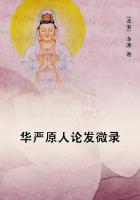Imitation.The child's first words are in part vocables of his own invention, which his parents adopt, and which, as far as they go, form a new human tongue upon the earth; and in part they are his more or less successful imitations of words he beers the parents use.But the instinct of imitating gestures develops earlier than that of imitating sounds, -- unless the sympathetic crying of a baby when it hears another cry may be reckoned as imitation of a sound.Professor Preyer speaks of his child imitating the protrusion of the father's lips in its fifteenth week.The various accomplishments of infancy, ****** 'pat-a-cake,' saying > bye-bye, 'blowing out the candle,' etc., usually fall well inside the limits of the first year.Later come all the various imitative games in which childhood revels, playing 'horse,' 'soldiers,' etc., etc.And from this time onward man is essentially the imitative animal.His whole educability and in fact the whole history of civilization depend on this trait, which his strong tendencies to rivalry, jealousy, and acquisitiveness reinforce.' Nil humani a me alienum puto ' is the motto of each individual of the species; and makes him, whenever another individual shows a power or superiority of any kind, restless until he can exhibit it himself.But apart from this kind of imitation, of which the psychological roots are complex, there is the more direct propensity to speak and walk and behave like others, usually without any conscious intention of so doing.And there is the imitative tendency which shows itself in large masses of men, and produces panics, and orgies, and frenzies of violence, and which only the rarest individuals can actively withstand.This sort of imitativeness is possessed by man in common with other gregarious animals, and is an instinct in the fullest sense of the term, being a, blind impulse to act as soon as a certain perception occurs.It is particularly hard not to imitate gaping, laughing, or looking and running in a certain direction, if we see others doing so.Certain mesmerized subjects must automatically imitate whatever motion their operator makes before their eyes. A
successful piece of mimicry gives to both bystanders and mimic a peculiar kind of aesthetic pleasure.The dramatic impulse, the tendency to pretend one is someone else, contains this pleasure of mimicry as one of its elements.
Another element seems to be a peculiar sense of power in stretching one's own personality so as to include that of a strange person.In young children this instinct often knows no bounds.For a few months in one of my children's third year, he literally hardly ever appeared in his own person.It was always, "Play I am So-and-so, and you are So-and-so, and the chair is such a thing, and then we'll do this or that." If you called him by his name, H., you invariably got the reply, " I'm not H., I'm a hyena, or a horse-car,"
or whatever the feigned object might it be.He outwore this impulse after a time; but while it lasted, it had every appearance of being the automatic result of ideas, often suggested by perceptions, working out irresistible motor effects.Imitation shades into Emulation or Rivalry , a very intense instinct, especially rife with young children, or at least especially undisguised.Everyone knows it.Nine-tenth of the work of the world is done by it.We know that if we do not do the task some-one else will do it and get the credit, so we do it.It has very little connection with sympathy, but rather more with pugnacity, which we proceed in turn to consider.
Pugnacity; anger; resentment.In many respects man is the most ruthlessly ferocious of beasts.As with all gregarious animals, 'two souls,'
as Faust says, 'dwell with-in his breast,' the one of sociability and helpfulness, the other of jealousy and antagonism to his mates.Though in a general way he cannot live without them, yet, as regards certain individuals, it often falls out that he cannot live with them either.Constrained to be a member of a tribe, he still has a right to decide, as far as in him lies, of which other members the tribe shall consist.Killing off a few
obnoxious ones may often better the chances of those that remain.And killing off a neighboring tribe from whom no good thing comes, but only competition, may materially better the lot of the whole tribe.Hence the gory cradle, the bellum onnium contra omnes , in which our race was reared; hence the fickleness of human ties, the ease with which the foe of yesterday becomes the ally of to-day, the friend of to-day the enemy of to-morrow;
hence the fact that we, the lineal representatives of the successful enactors of one scene of slaughter after another, must, whatever more pacific virtues we may also possess, still carry about with us, ready at any moment to burst into flame, the smouldering and sinister traits of character by means of which they lived through so many massacres, harming others, but themselves unharmed.
Sympathy is an emotion as to whose instinctiveness psychologists have held hot debate, some of them contending that it is no primitive endowment, but, originally at least, the result of a rapid calculation of the good consequences to ourselves of the sympathetic act.Such a calculation, at first conscious, would grow more unconscious as it became more habitual, and at last, tradition and association aiding, might prompt to actions which could not be distinguished from immediate impulses.It is hardly needful to argue against the falsity of this view.Some forms of sympathy, that of mother with child, for example, are surely primitive, and not intelligent forecasts of board and lodging and other support to be reaped in old age.
Danger to the child blindly and instantaneously stimulates the mother to actions of alarm or defence.Menace or harm to the ***** beloved or friend excites us in a corresponding way, often against all the dictates of prudence.














